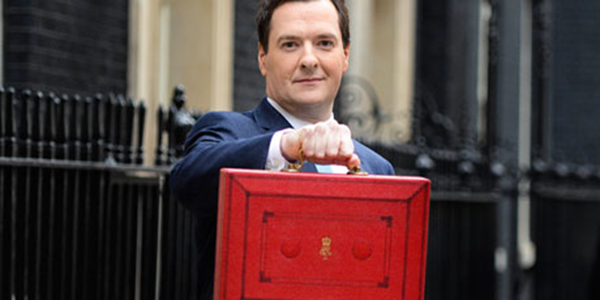The GGF had “mixed feelings” after Chancellor of the Exchequer, George Osborne, announced his 2014 Budget.
The Budget promised a raft of positive measures for SMEs, manufacturers and exporters but the Federation felt the Chancellor could have done more to support the recovery in the construction industry and in particular the need to improve the energy efficiency of the UK’s building stock.
Nigel Rees GGF Group Chief Executive commented: “Of course we are delighted to hear the Chancellor’s measures to help SMEs with plans such as the creation of the Builders Finance Fund and the doubling of the Annual Investment Allowance (AIA). It was also good to see the Government’s intention to fund the regeneration of housing estates and we welcome the extension to the “Help to Buy” Scheme.
“However, we are disappointed that there was no movement on the VAT rate on home improvements, repair and maintenance work. In addition, the distinct lack of incentives in this Budget to encourage homeowners to invest in energy efficient home improvements was quite incredible; particularly when you consider the extremely poor uptake of the Green Deal and how ambitious the Government was four years ago with its plan to reduce carbon emissions.”
Giles Willson, Deputy Chief Executive and Director of Technical Affairs commented; “It was positive to hear the Government’s support for apprenticeships and I hope our industry will take advantage of these measures. I was also pleased to hear the Government are working on proposals to tackle fuel poverty and it will be interesting to see the new strategy after the threats of cuts last year to the ECO (Energy Company Obligation) and other energy green levies.”
The GGF’s political advisers GK Strategy have reviewed the Budget and its accompanying documents and have provided a summary of the key measures announced by the Chancellor below. The full Budget document can be found here.
Key points from the Budget that may interest GGF Members
The Chancellor gave a summary of the government’s long-term economic plan which includes:
- reducing the deficit to deal with the UK’s debts, safeguard the UK economy for the long term and keep mortgage rates low.
- cutting income taxes and freezing fuel duty to help hardworking people be more financially secure.
- creating more jobs by backing small business and enterprise with better infrastructure and lower job taxes.
- delivering the best schools, skills and apprenticeships for young people so the next generation can succeed in the global race.
More specific aspects of the Budget which will impact on the construction sector include:
Energy
The government will:
- reduce business energy costs to ensure that the UK remains a competitive location for manufacturing, including by capping the Carbon Price Support rate at £18 from 2016-17 to 2019-20 and providing targeted support to energy intensive industries and Combined Heat and Power plants.
- provide £60 million to develop new technologies to support carbon capture and storage.
- take further action to boost housing supply by extending the Help to Buy equity loan scheme, creating a £500 million Builders Finance Fund to provide loans to SME housing developers, and creating an Urban Development Corporation for a new garden city in Ebbsfleet.
- set out plans for how they will help microbusinesses make full use of smart meters.
Housing and planning
- By Autumn Statement 2014 the government will look to quantify its housing and growth ambitions for this new surplus land programme.
- To help a further 120,000 households purchase a home and to continue to support house building as the market improves, the government will extend the equity loan scheme to March 2020. The Help to Buy mortgage guarantee scheme will continue to support access to high loan to value mortgages until the scheme ends on 31 December 2016.
- To support SME access to finance, the government will create a £500 million Builders Finance Fund, which will provide loans to developers to unlock 15,000 housing units stalled due to difficulty in accessing finance.
- For people who want to build their own home, the government will consult on creating a new ‘Right to Build’, giving custom builders a right to a plot from councils, and a £150 million repayable fund to help provide up to 10,000 serviced plots for custom build.
- The government will establish a £150 million fund to kick start the regeneration of large housing estates through repayable loans, helping to boost housing supply.
- The government is committed to making the planning system work for major infrastructure projects and will shortly publish the outcomes of its consultation on the Nationally Significant Infrastructure Planning Regime, including a series of measures to streamline and improve the process.
- The government will review the General Permitted Development Order.
- As part of this, the government will consult on specific change of use measures, including greater flexibilities for change to residential use, for example from warehouses and light industry structures, and allowing businesses greater flexibilities to expand facilities such as car parks and loading bays within existing boundaries, where there is little impact on local communities.
Fuel Poverty:
- The government is committed to helping households with their energy bills and reducing fuel poverty. The government will shortly be publishing its proposals for a new fuel poverty target and strategy and as part of this will consider the particular challenges faced by those households that are not connected to the gas grid.
Exports
- To further support innovative start-ups and early stage companies to invest in research and development, the government will raise the rate of the R&D tax credit payable to loss making small and medium sized companies from 11% to 14.5% from April 2014. Over the next five years this increase will support £1.3 billion of investment in innovation.
The government will:
- become much more proactive in support of UK business who want to expand globally, including supporting the UK-based supply chains of exporters and intangible exports for the first time by expanding the remit of UKEF and changing its underpinning legislation.
- overhaul UK Export Finance’s (UKEF) direct lending programme, doubling it to £3 billion and cutting interest rates to the lowest permitted levels to provide competitive financing that helps UK firms win contracts and expand overseas.
- ensure that UK businesses are able to take advantage of new global opportunities by offering the best export finance in Europe – doubling the UK’s direct lending programme to £3 billion and cutting interest rates – and reducing the cost of long-distance flights for exporters and visitors to the UK by abolishing two tax bands.
Apprenticeships:
- The government is building on the success of the Apprenticeship Grants for Employers (AGE) scheme, by providing an extra £85 million in both 2014-15 and 2015-16 for over 100,000 grants to employers.
- Degree and masters level apprenticeships – The government will provide £20 million over 2 years to support apprenticeships up to postgraduate level.
Businesses:
- To continue to support business investment, the government is doubling the annual investment allowance (AIA) to £500,000 from April 2014 until the end of 2015. This will particularly benefit small and medium sized firms. The increased AIA will mean that up to 4.9 million firms – 99.8% of businesses – will receive 100% up-front relief on their qualifying investment in plant and machinery.
National Minimum Wage
- The adult NMW rate will increase by 3% to £6.50 from October 2014, representing the largest cash increase since 2008 and the first real terms increase since 2007. There will also be increases of 2% for the youth and apprentice NMW rates from October 2014.
Pensions:
- The government will introduce the most fundamental reform to the way people access their pensions in almost a century by abolishing the effective requirement to buy an annuity, giving people much greater freedom over how they access their pension savings.
- From April 2015, the government will change the tax rules to allow people to access their defined contribution pension savings as they wish from the point of retirement. The government will introduce a new guarantee that everyone who retires with a defined contribution pension will be offered free and impartial face-to-face guidance on their choices at the point of retirement. This will take effect from April 2015.
- The Budget also announces further details of a new scheme of Voluntary National Insurance contributions (VNICs) to allow pensioners to top up their Additional State Pension. The scheme will be open for 18 months from October 2015 and available to everyone reaching State Pension age before 6 April 2016.
- As announced at Autumn Statement 2013, the government will increase the Share Incentive Plans annual limits to £3,600 per year for free shares and to £1,800 per year for partnership shares. The maximum monthly amount that an employee can contribute to Save As You Earn (SAYE) savings arrangements will increase from £250 to £500. These changes will take effect from April 2014.
Taxation
- Corporation tax will fall to 21% in April 2014 before reaching 20% in April 2015.
- The small profits rate of corporation tax will remain at 20% from April 2014.
- The government will legislate to ensure that VAT is accounted for on the actual price paid for goods and services where prompt payment discounts are offered. The change will come into effect on 1 May 2014 for supplies of telecommunication and broadcasting services to consumers and 1 April 2015 for other goods and services.
Judicial review
- The government, working closely with the judiciary, will launch a new Planning Court on 6 April 2014 to fast-track disputes, including big construction projects.
Nigel Rees summarised, “The first quarter of 2014 shows growth, a positive sign that the UK construction industry is emerging from arguably its toughest economic period in 20 years. We welcome the positive measures for business proposed by the Chancellor but the GGF will continue to lobby Government on the Federation’s many campaigns for the benefit of our Members and for the long term growth in the industry.”




















